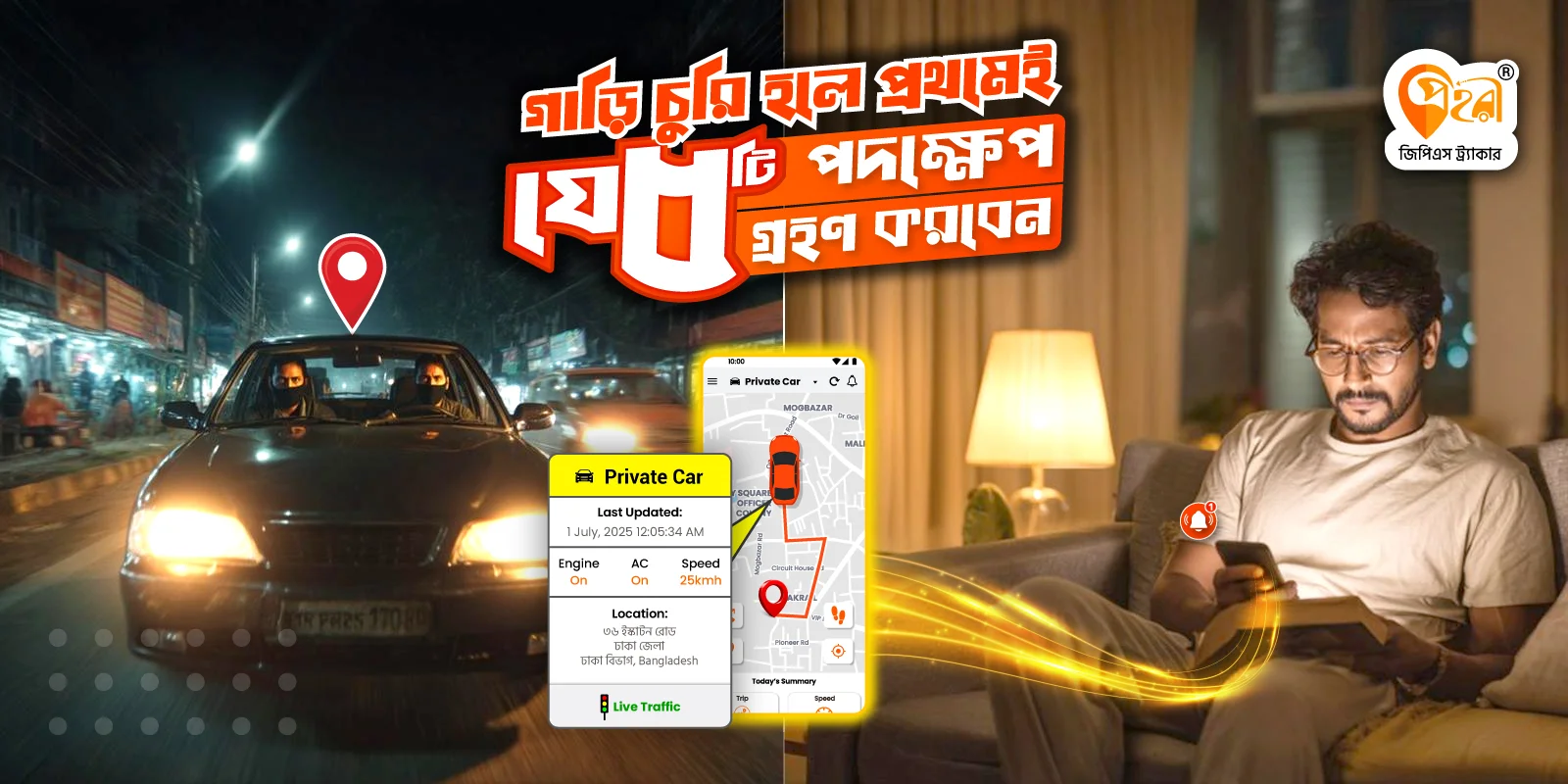а¶Жа¶Ьа¶ХаІЗа¶∞ а¶Па¶З а¶ђаІНа¶ѓа¶ЄаІНට а¶ЬаІАඐථаІЗ,а¶Ча¶Ња¶°а¶Ља¶њ а¶Ѓа¶Ња¶≤а¶ња¶Х а¶Па¶ђа¶В а¶ЂаІНа¶≤а¶ња¶Я а¶ЃаІНඃඌථаІЗа¶Ьа¶Ња¶∞බаІЗа¶∞ а¶ЬථаІНа¶ѓ а¶Ьග඙ගа¶Па¶Є а¶ЯаІНа¶∞аІНа¶ѓа¶Ња¶Ха¶Ња¶∞ а¶ЦаІБа¶ђа¶З ඙аІНа¶∞аІЯаІЛа¶ЬථаІАаІЯ а¶Па¶Ха¶Яа¶њ а¶ђа¶ња¶ЈаІЯ а¶єаІЯаІЗ а¶ЙආаІЗа¶ЫаІЗа•§ а¶Па¶Яа¶њ а¶∞а¶Ња¶ЄаІНටඌаІЯ а¶Ча¶Ња¶°а¶Ља¶њ а¶Ъа¶Ња¶≤ඌථаІЛа¶∞ а¶Єа¶ЃаІЯ ඪආගа¶Х а¶∞аІБа¶Я а¶ђаІЗа¶ЫаІЗ ථගටаІЗ, а¶Ча¶ЊаІЬа¶њ а¶ЪаІБа¶∞а¶њ ආаІЗа¶ХඌටаІЗ а¶Па¶ђа¶В а¶Ча¶Ња¶°а¶Ља¶ња¶∞ а¶∞а¶њаІЯаІЗа¶≤ а¶Яа¶Ња¶За¶Ѓ а¶Еа¶ђа¶ЄаІНඕඌථ а¶ЬඌථඌටаІЗ а¶Єа¶Ња¶єа¶Ња¶ѓаІНа¶ѓ а¶Ха¶∞аІЗа•§ а¶ХගථаІНටаІБ а¶Пට а¶Єа¶ђ а¶Ха¶ња¶ЫаІБа¶∞ а¶Ѓа¶Ња¶ЭаІЗа¶У а¶Ьග඙ගа¶Па¶Є а¶ЯаІНа¶∞аІНа¶ѓа¶Ња¶Ха¶Ња¶∞ а¶Ж඙ථඌа¶∞ а¶ЧаІЛ඙ථаІАඃඊටඌ ථගඃඊаІЗ а¶Єа¶Ѓа¶ЄаІНа¶ѓа¶Њ ටаІИа¶∞а¶њ а¶Ха¶∞ටаІЗ ඙ඌа¶∞аІЗа•§ а¶ѓаІЗඁථ, а¶Еа¶ђаІИа¶Іа¶≠а¶Ња¶ђаІЗ а¶ХаІЗа¶Йа¶ХаІЗ а¶ЯаІНа¶∞аІНа¶ѓа¶Ња¶Х а¶Ха¶∞а¶Њ а¶ђа¶Њ а¶ђаІНа¶ѓа¶ХаІНටගа¶Чට ටඕаІНа¶ѓ а¶ЪаІБа¶∞а¶њ а¶Ха¶∞а¶Ња•§ а¶ЕථаІЗа¶Х ඁඌථаІБа¶Ј а¶ЬඌථаІЗ ථඌ а¶Ха¶ња¶≠а¶Ња¶ђаІЗ а¶ЯаІНа¶ѓа¶Ња¶Ха¶ња¶В а¶Єа¶Ња¶∞аІНа¶≠а¶ња¶ЄаІЗ ඙аІНа¶∞а¶≠а¶Ња¶За¶°а¶Ња¶∞ а¶ХаІЛа¶ЃаІН඙ඌථගа¶ЧаІБа¶≤аІЛ ටඌබаІЗа¶∞ а¶Еа¶ђа¶ЄаІНඕඌථ а¶Єа¶ЃаІН඙а¶∞аІНа¶Хගට ටඕаІНа¶ѓ а¶Єа¶Ва¶ЧаІНа¶∞а¶є а¶Ха¶∞аІЗ а¶Па¶ђа¶В ටඌ පаІЗа¶ѓа¶Ља¶Ња¶∞ а¶Ха¶∞аІЗа•§ а¶Жа¶Ьа¶ХаІЗа¶∞ а¶ђаІНа¶≤а¶Ча¶ЯගටаІЗ, а¶Жа¶Ѓа¶∞а¶Њ а¶Ьග඙ගа¶Па¶Є а¶ЯаІНа¶∞аІНа¶ѓа¶Ња¶Ха¶Ња¶∞ а¶ђаІНа¶ѓа¶ђа¶єа¶Ња¶∞а¶Ха¶Ња¶∞аІАබаІЗа¶∞ ටඕаІНа¶ѓаІЗа¶∞ а¶ЧаІЛ඙ථаІАඃඊටඌ а¶Па¶ђа¶В ථගа¶∞ඌ඙ටаІНටඌа¶Ьථගට а¶Єа¶Ѓа¶ЄаІНа¶ѓа¶Њ а¶Па¶ђа¶В ඪඁඌ඲ඌථ ඙ඌа¶Уа¶ѓа¶Ља¶Ња¶∞ а¶Ха¶ња¶ЫаІБ а¶Й඙ඌඃඊ а¶Жа¶≤аІЛа¶Ъථඌ а¶Ха¶∞а¶ђа•§
а¶Ьග඙ගа¶Па¶Є а¶ЯаІНа¶∞аІНа¶ѓа¶Ња¶Ха¶Ња¶∞аІЗа¶∞ а¶ђаІНа¶ѓа¶ђа¶єа¶Ња¶∞
а¶Ьග඙ගа¶Па¶Є а¶ЯаІНа¶∞аІНа¶ѓа¶Ња¶Ха¶Ња¶∞ а¶ЖඁඌබаІЗа¶∞ а¶ЬаІАඐථаІЗ а¶ђа¶ња¶≠ගථаІНථ а¶Ха¶Ња¶ЬаІЗ а¶Єа¶Ња¶єа¶Ња¶ѓаІНа¶ѓ а¶Ха¶∞аІЗ, ඐගපаІЗඣට а¶ђаІНа¶ѓа¶ђа¶Єа¶Њ а¶Па¶ђа¶В а¶ђаІНа¶ѓа¶ХаІНටගа¶Чට ථගа¶∞ඌ඙ටаІНටඌ а¶ХаІНа¶ЈаІЗටаІНа¶∞аІЗа•§ а¶Па¶ЧаІБа¶≤а¶њ а¶Ча¶ЊаІЬа¶њ а¶ђа¶Њ а¶ЂаІНа¶≤а¶ња¶Я ඙а¶∞а¶ња¶Ъа¶Ња¶≤ථඌ ඕаІЗа¶ХаІЗ පаІБа¶∞аІБ а¶Ха¶∞аІЗ а¶ЖඁඌබаІЗа¶∞ ඙аІНа¶∞а¶њаІЯа¶ЬථබаІЗа¶∞ ථගа¶∞ඌ඙ටаІНටඌ ථගපаІНа¶Ъගට а¶Ха¶∞ටаІЗ а¶ђаІНа¶ѓа¶ђа¶єаІГට а¶єаІЯа•§ ථගඁаІНථаІЗ а¶Ха¶ња¶ЫаІБ а¶Йබඌයа¶∞а¶£ බаІЗа¶УаІЯа¶Њ а¶єа¶≤аІЛ:
- а¶ЂаІНа¶≤а¶ња¶Я а¶ЃаІНඃඌථаІЗа¶Ьа¶ЃаІЗථаІНа¶Я: а¶Жа¶Ьа¶Ха¶Ња¶≤ а¶ЕථаІЗа¶Х ඙аІНа¶∞ටගඣаІНආඌථ ටඌබаІЗа¶∞ а¶Ча¶ЊаІЬа¶њ а¶ђа¶Њ а¶ЂаІНа¶≤а¶ња¶ЯаІЗа¶∞ а¶Ха¶Ња¶∞аІНа¶ѓа¶ХаІНа¶∞а¶Ѓ ඁථගа¶Яа¶∞ а¶Ха¶∞ටаІЗ а¶Ьග඙ගа¶Па¶Є а¶ЯаІНа¶∞аІНа¶ѓа¶Ња¶Ха¶Ња¶∞ а¶ђаІНа¶ѓа¶ђа¶єа¶Ња¶∞ а¶Ха¶∞аІЗа•§ а¶Па¶Ха¶Яа¶њ а¶Ьග඙ගа¶Па¶Є а¶Ча¶ЊаІЬа¶ња¶∞ а¶Ъа¶≤а¶Ња¶Ъа¶≤ а¶ЯаІНа¶∞аІНа¶ѓа¶Ња¶Х а¶Ха¶∞аІЗ а¶Па¶ђа¶В ඙аІНа¶∞ටගඣаІНආඌථа¶ХаІЗ ටඌබаІЗа¶∞ а¶∞аІБа¶Я а¶Єа¶ЃаІН඙а¶∞аІНа¶ХаІЗ а¶Іа¶Ња¶∞а¶£а¶Њ බаІЗаІЯ ඙ඌපඌ඙ඌපග ඪආගа¶Ха¶≠а¶Ња¶ђаІЗ а¶∞аІБа¶Я ඙аІНа¶≤аІНඃඌථ а¶Ха¶∞ටаІЗ а¶Єа¶єа¶ЊаІЯටඌ а¶Ха¶∞аІЗ, а¶Ђа¶≤аІЗ а¶Єа¶ЃаІЯ а¶У а¶ЬаІНа¶ђа¶Ња¶≤ඌථග ඪඌපаІНа¶∞аІЯ а¶єаІЯа•§ а¶Па¶Ыа¶ЊаІЬа¶Њ, а¶Ча¶ЊаІЬа¶ња¶∞ а¶Еа¶ђа¶ЄаІНඕඌථ а¶Ьඌථඌ ඕඌа¶Ха¶≤аІЗ а¶ХаІЛථаІЛ а¶Е඙аІНа¶∞ටаІНඃඌපගට а¶Ша¶Яථඌ а¶ђа¶Њ а¶ЕථаІНа¶ѓ а¶Єа¶Ѓа¶ЄаІНа¶ѓа¶Њ බаІЗа¶Ца¶Њ බගа¶≤аІЗ ටඌ බаІНа¶∞аІБට ඪඁඌ඲ඌථ а¶Ха¶∞а¶Њ а¶Єа¶ЃаІНа¶≠а¶ђ а¶єаІЯа•§
- а¶ђаІНа¶ѓа¶ХаІНටගа¶Чට ථගа¶∞ඌ඙ටаІНටඌ: а¶Ѓа¶Њ-а¶ђа¶Ња¶ђа¶Ња¶∞а¶Њ ටඌබаІЗа¶∞ පගපаІБබаІЗа¶∞ ථගа¶∞ඌ඙ටаІНටඌ ථගපаІНа¶Ъගට а¶Ха¶∞ටаІЗ а¶Ьග඙ගа¶Па¶Є а¶ЯаІНа¶∞аІНа¶ѓа¶Ња¶Ха¶Ња¶∞ а¶ђаІНа¶ѓа¶ђа¶єа¶Ња¶∞ а¶Ха¶∞аІЗа¶®а•§ а¶Па¶∞ а¶Ѓа¶Ња¶ІаІНа¶ѓа¶ЃаІЗ ටඌа¶∞а¶Њ а¶Єа¶єа¶ЬаІЗа¶З а¶ЬඌථඌටаІЗ ඙ඌа¶∞аІЗථ, පගපаІБ а¶ХаІЛඕඌаІЯ а¶ѓа¶Ња¶ЪаІНа¶ЫаІЗ а¶Па¶ђа¶В ටඌа¶∞ а¶Еа¶ђа¶ЄаІНඕඌථ а¶ХаІЛඕඌаІЯа•§ а¶Па¶Ха¶За¶≠а¶Ња¶ђаІЗ, а¶Ча¶ЊаІЬа¶њ а¶ЪаІБа¶∞а¶њ ඕаІЗа¶ХаІЗ а¶∞а¶ХаІНа¶Ја¶Њ ඙аІЗටаІЗ а¶ЕථаІЗа¶Х а¶Ча¶ЊаІЬа¶ња¶∞ а¶Ѓа¶Ња¶≤а¶ња¶Х ටඌබаІЗа¶∞ а¶Ча¶ЊаІЬගටаІЗ а¶Ьග඙ගа¶Па¶Є а¶ЯаІНа¶∞аІНа¶ѓа¶Ња¶Ха¶Ња¶∞ а¶ђаІНа¶ѓа¶ђа¶єа¶Ња¶∞ а¶Ха¶∞аІЗа•§ а¶Па¶Яа¶њ а¶Ча¶ЊаІЬа¶ња¶∞ а¶Еа¶ђа¶ЄаІНඕඌථ а¶ЯаІНа¶∞аІНа¶ѓа¶Ња¶Х а¶Ха¶∞аІЗ ඃඌටаІЗ а¶ХаІЛථаІЛ а¶ЪаІБа¶∞а¶ња¶∞ а¶Ша¶Яථඌ а¶Ша¶Яа¶≤аІЗ බаІНа¶∞аІБට а¶ђаІНа¶ѓа¶ђа¶ЄаІНඕඌ ථаІЗаІЯа¶Њ а¶Єа¶ЃаІНа¶≠а¶ђ а¶єаІЯа•§
- а¶≤а¶Ьа¶ња¶ЄаІНа¶Яа¶ња¶Ха¶Є а¶Па¶ђа¶В ඪඌ඙аІНа¶≤а¶Ња¶З а¶ЪаІЗа¶Зථ: а¶≤а¶Ьа¶ња¶ЄаІНа¶Яа¶ња¶Х а¶У ඪඌ඙аІНа¶≤а¶Ња¶З а¶ЪаІЗа¶Зථ а¶ЗථаІНа¶°а¶Ња¶ЄаІНа¶ЯаІНа¶∞а¶ња¶∞ а¶ЬථаІНа¶ѓ а¶Ьග඙ගа¶Па¶Є ඙аІНа¶∞а¶ѓаІБа¶ХаІНටග а¶ЕටаІНඃථаІНට а¶ЧаІБа¶∞аІБටаІНඐ඙аІВа¶∞аІНа¶£ а¶Па¶Ха¶Яа¶њ а¶ђа¶ња¶ЈаІЯа•§ а¶™а¶£аІНа¶ѓ ඙а¶∞ගඐයථа¶Ха¶Ња¶∞аІА ඙аІНа¶∞ටගඣаІНආඌථа¶ЧаІБа¶≤аІЛ ටඌබаІЗа¶∞ а¶Ѓа¶Ња¶≤а¶Ња¶Ѓа¶Ња¶≤ а¶ђа¶Њ පග඙ඁаІЗථаІНа¶ЯаІЗа¶∞ а¶≤аІЛа¶ХаІЗපථ а¶Ьග඙ගа¶Па¶Є а¶ЯаІНа¶∞аІНа¶ѓа¶Ња¶Ха¶Ња¶∞ බගаІЯаІЗ а¶ЯаІНа¶∞аІНа¶ѓа¶Ња¶Х а¶Ха¶∞аІЗа•§ а¶ЯаІНа¶∞аІНа¶ѓа¶Ња¶Ха¶Ња¶∞ а¶ђаІНа¶ѓа¶ђа¶єа¶Ња¶∞аІЗа¶∞ а¶Ђа¶≤аІЗ ටඌа¶∞а¶Њ ථගපаІНа¶Ъගට යටаІЗ ඙ඌа¶∞аІЗ а¶™а¶£аІНа¶ѓа¶Єа¶ЃаІВа¶є ථගа¶∞аІНа¶Іа¶Ња¶∞ගට а¶Єа¶ЃаІЯаІЗа¶∞ а¶Ѓа¶ІаІНа¶ѓаІЗ а¶ЧථаІНටඐаІНа¶ѓаІЗ ඙аІМа¶Ба¶Ыа¶Ња¶ђаІЗ, а¶Па¶ђа¶В පග඙ඁаІЗථаІНа¶ЯаІЗ а¶ХаІЛථаІЛ а¶ђа¶ња¶≤а¶ЃаІНа¶ђ а¶Ха¶ња¶Ва¶ђа¶Њ а¶Єа¶Ѓа¶ЄаІНа¶ѓа¶Њ а¶Ша¶Яа¶≤аІЗ බаІНа¶∞аІБට ඪඁඌ඲ඌථ а¶Ха¶∞ටаІЗ ඙ඌа¶∞а¶ђаІЗа•§
- а¶Жа¶ЗථපаІГа¶ЩаІНа¶Ца¶≤а¶Њ а¶∞а¶ХаІНа¶Ја¶Њ: а¶Жа¶ЗථපаІГа¶ЩаІНа¶Ца¶≤а¶Њ а¶∞а¶ХаІНа¶Ја¶Њ а¶Єа¶Ва¶ЄаІНඕඌа¶ЧаІБа¶≤аІЛа¶∞ а¶ЬථаІНа¶ѓа¶У а¶Ьග඙ගа¶Па¶Є а¶ЯаІНа¶∞аІНа¶ѓа¶Ња¶Ха¶ња¶В а¶ЕටаІНඃථаІНට а¶Ха¶Ња¶∞аІНа¶ѓа¶Ха¶∞аІА а¶≠аІВа¶Ѓа¶ња¶Ха¶Њ ඙ඌа¶≤ථ а¶Ха¶∞аІЗ а¶Жа¶Єа¶ЫаІЗ а•§ ඙аІБа¶≤ගප а¶ђа¶Њ а¶Жа¶Зථ ඙аІНа¶∞аІЯаІЛа¶Ча¶Ха¶Ња¶∞аІА а¶Єа¶Ва¶ЄаІНඕඌа¶ЧаІБа¶≤аІЛ а¶Е඙а¶∞а¶Ња¶ІаІА ඪථඌа¶ХаІНට а¶Ха¶∞ටаІЗ а¶Па¶ђа¶В ටඌබаІЗа¶∞ а¶Еа¶ђа¶ЄаІНඕඌථ а¶ЬඌථටаІЗ а¶Ьග඙ගа¶Па¶Є а¶ЯаІНа¶∞аІНа¶ѓа¶Ња¶Ха¶Ња¶∞ а¶ђаІНа¶ѓа¶ђа¶єа¶Ња¶∞ а¶Ха¶∞аІЗа•§ а¶Па¶Яа¶њ а¶Е඙а¶∞а¶Ња¶ІаІАබаІЗа¶∞ а¶Іа¶∞ටаІЗ а¶Єа¶Ња¶єа¶Ња¶ѓаІНа¶ѓ а¶Ха¶∞аІЗ а¶Па¶ђа¶В а¶Ьථа¶Ча¶£аІЗа¶∞ ථගа¶∞ඌ඙ටаІНටඌ ථගපаІНа¶Ъගට а¶Ха¶∞ටаІЗ а¶ЧаІБа¶∞аІБටаІНඐ඙аІВа¶∞аІНа¶£ а¶≠аІВа¶Ѓа¶ња¶Ха¶Њ ඙ඌа¶≤ථ а¶Ха¶∞аІЗа•§
- ඙аІЛа¶Ја¶Њ ඙аІНа¶∞а¶Ња¶£аІА а¶ЯаІНа¶∞аІНа¶ѓа¶Ња¶Ха¶ња¶В: ඙аІЛа¶Ја¶Њ ඙аІНа¶∞а¶Ња¶£аІАа¶∞ а¶Ѓа¶Ња¶≤а¶ња¶Ха¶∞а¶Њ ටඌබаІЗа¶∞ ඙аІЛа¶ЈаІНඃබаІЗа¶∞ ථගа¶∞ඌ඙ටаІНටඌ ථගපаІНа¶Ъගට а¶Ха¶∞ටаІЗ а¶Ьග඙ගа¶Па¶Є а¶ЯаІНа¶∞аІНа¶ѓа¶Ња¶Ха¶Ња¶∞ а¶ђаІНа¶ѓа¶ђа¶єа¶Ња¶∞ а¶Ха¶∞аІЗа•§ а¶Па¶Яа¶њ ඙аІНа¶∞а¶Ња¶£аІАа¶∞ а¶Еа¶ђа¶ЄаІНඕඌථ а¶ЯаІНа¶∞аІНа¶ѓа¶Ња¶Х а¶Ха¶∞ටаІЗ а¶Єа¶Ња¶єа¶Ња¶ѓаІНа¶ѓ а¶Ха¶∞аІЗ, ඃඌටаІЗ а¶Па¶Яа¶њ а¶єа¶Ња¶∞а¶њаІЯаІЗ а¶ѓа¶Ња¶УаІЯа¶Ња¶∞ ඙а¶∞ а¶Єа¶єа¶ЬаІЗа¶З а¶ЦаІБа¶Ба¶ЬаІЗ ඙ඌа¶УаІЯа¶Њ а¶ѓа¶ЊаІЯа•§ ඃබග а¶ХаІЛථаІЛ а¶Ха¶Ња¶∞а¶£аІЗ ඙аІНа¶∞а¶Ња¶£аІАа¶Яа¶њ а¶єа¶Ња¶∞а¶њаІЯаІЗ а¶ѓа¶ЊаІЯ, ටඐаІЗ а¶ЯаІНа¶∞аІНа¶ѓа¶Ња¶Ха¶Ња¶∞а¶Яа¶њ බаІНа¶∞аІБට а¶Еа¶ђа¶ЄаІНඕඌථ ඪථඌа¶ХаІНට а¶Ха¶∞ටаІЗ а¶Єа¶єа¶ЊаІЯටඌ а¶Ха¶∞аІЗа•§
- а¶ђаІЯа¶ЄаІНа¶ХබаІЗа¶∞ ඃටаІНථ: а¶ЕථаІЗа¶Х ඙а¶∞а¶ња¶ђа¶Ња¶∞ ටඌබаІЗа¶∞ а¶ђаІЯа¶ЄаІНа¶Х ඪබඪаІНඃබаІЗа¶∞ ථගа¶∞ඌ඙බ а¶∞а¶Ња¶ЦටаІЗ а¶Ьග඙ගа¶Па¶Є а¶ЯаІНа¶∞аІНа¶ѓа¶Ња¶Ха¶Ња¶∞ а¶ђаІНа¶ѓа¶ђа¶єа¶Ња¶∞ а¶Ха¶∞аІЗа•§ ඐගපаІЗඣට, Alzheimer а¶∞аІЛа¶ЧаІАබаІЗа¶∞ а¶ЬථаІНа¶ѓ а¶Па¶Яа¶њ а¶ЕටаІНඃථаІНට а¶Й඙а¶Ха¶Ња¶∞аІАа•§ а¶ѓа¶Цථ а¶ђаІЯа¶ЄаІНа¶Ха¶∞а¶Њ а¶Ша¶∞ ඕаІЗа¶ХаІЗ а¶ђаІЗа¶∞а¶њаІЯаІЗ ඃඌථ а¶Па¶ђа¶В ටඌබаІЗа¶∞ а¶Еа¶ђа¶ЄаІНඕඌථ а¶ЯаІНа¶∞аІНа¶ѓа¶Ња¶Х а¶Ха¶∞а¶Њ බа¶∞а¶Ха¶Ња¶∞ а¶єаІЯ, ටа¶Цථ а¶Па¶З а¶ЯаІНа¶∞аІНа¶ѓа¶Ња¶Ха¶Ња¶∞а¶Яа¶њ ටඌබаІЗа¶∞ ඪආගа¶Х а¶Еа¶ђа¶ЄаІНඕඌථ а¶ЬඌථඌටаІЗ а¶Єа¶єа¶ЊаІЯටඌ а¶Ха¶∞а¶ђаІЗа•§ а¶Па¶∞ а¶Ѓа¶Ња¶ІаІНа¶ѓа¶ЃаІЗ ඙а¶∞а¶ња¶ђа¶Ња¶∞аІЗа¶∞ ඪබඪаІНа¶ѓа¶∞а¶Њ ටඌබаІЗа¶∞ ඙аІНа¶∞а¶њаІЯа¶ЬථබаІЗа¶∞ а¶Єа¶∞аІНඐබඌ ථа¶Ьа¶∞ а¶∞а¶Ња¶ЦටаІЗ ඙ඌа¶∞аІЗ а¶Па¶ђа¶В ටඌබаІЗа¶∞ ථගа¶∞ඌ඙ටаІНටඌ ථගපаІНа¶Ъගට а¶Ха¶∞ටаІЗ ඙ඌа¶∞а¶ђаІЗа•§
а¶ЯаІНа¶∞аІНа¶ѓа¶Ња¶Ха¶Ња¶∞ а¶ђаІНа¶ѓа¶ђа¶єа¶Ња¶∞аІЗа¶∞ а¶Ѓа¶Ња¶ІаІНа¶ѓа¶ЃаІЗ а¶ЖඁඌබаІЗа¶∞ а¶ЬаІАඐථа¶ХаІЗ а¶Жа¶∞аІЛ ථගа¶∞ඌ඙බ а¶Па¶ђа¶В а¶Єа¶єа¶Ь а¶єаІЯаІЗ а¶Йආа¶ЫаІЗ, ටඐаІЗ а¶Па¶∞ ඪඌඕаІЗ а¶ђаІНа¶ѓа¶ХаІНටගа¶Чට а¶ЧаІЛ඙ථаІАаІЯටඌ а¶Єа¶ЃаІН඙а¶∞аІНа¶Хගට а¶Ха¶ња¶ЫаІБ а¶ЙබаІНа¶ђаІЗа¶Ча¶У а¶∞аІЯаІЗа¶ЫаІЗ, а¶ѓа¶Њ а¶ђаІНа¶ѓа¶ђа¶єа¶Ња¶∞а¶Ха¶Ња¶∞аІАබаІЗа¶∞ ථа¶Ьа¶∞аІЗ а¶∞а¶Ња¶ЦටаІЗ а¶єа¶ђаІЗа•§
а¶Ьග඙ගа¶Па¶Є а¶ЯаІНа¶∞аІНа¶ѓа¶Ња¶Ха¶Ња¶∞аІЗа¶∞ а¶ЧаІЛ඙ථаІАඃඊටඌа¶Ьථගට а¶Єа¶Ѓа¶ЄаІНа¶ѓа¶Њ
а¶Ьග඙ගа¶Па¶Є а¶ЯаІНа¶∞аІНа¶ѓа¶Ња¶Ха¶Ња¶∞аІЗа¶∞ а¶ЧаІЛ඙ථаІАඃඊටඌа¶Ьථගට а¶Єа¶Ѓа¶ЄаІНа¶ѓа¶Њ а¶Па¶Ха¶Яа¶њ а¶ЧаІБа¶∞аІБටаІНඐ඙аІВа¶∞аІНа¶£ а¶ђа¶ња¶Ја¶ѓа¶Љ, ඐගපаІЗа¶Ј а¶Ха¶∞аІЗ а¶ѓа¶Цථ а¶Па¶Яа¶њ а¶ђаІНа¶ѓа¶ХаІНටගа¶Чට ටඕаІНа¶ѓ а¶Єа¶Ва¶ЧаІНа¶∞а¶є а¶Ха¶∞аІЗа•§ а¶ЯаІНа¶∞аІНа¶ѓа¶Ња¶Ха¶ња¶В а¶°а¶ња¶≠а¶Ња¶За¶Єа¶ЧаІБа¶≤аІЛ а¶Єа¶Ња¶Іа¶Ња¶∞а¶£а¶§ а¶ђаІНа¶ѓа¶ђа¶єа¶Ња¶∞а¶Ха¶Ња¶∞аІАа¶∞ а¶Чටගඐග඲ග, а¶Еа¶ђа¶ЄаІНඕඌථ, а¶Па¶ђа¶В а¶ЕථаІНඃඌථаІНа¶ѓ ටඕаІНа¶ѓ а¶∞аІЗа¶Ха¶∞аІНа¶° а¶Ха¶∞аІЗ, а¶ѓа¶Њ а¶Ж඙ථඌа¶∞ а¶ђаІНа¶ѓа¶ХаІНටගа¶Чට а¶ЧаІЛ඙ථаІАඃඊටඌа¶∞ а¶ХаІНа¶ЈаІЗටаІНа¶∞аІЗ а¶ЭаІБа¶Ба¶Ха¶њ ටаІИа¶∞а¶њ а¶Ха¶∞ටаІЗ ඙ඌа¶∞аІЗа•§ а¶Па¶З а¶Єа¶ЃаІН඙а¶∞аІНа¶ХаІЗ а¶ђа¶ња¶ЄаІНටඌа¶∞ගට ටඕаІНа¶ѓ ථගඁаІНථаІЗ බаІЗа¶УаІЯа¶Њ а¶єа¶≤аІЛ
аІІа•§ а¶ЕථаІБඁටග а¶Ыа¶ЊаІЬа¶Њ а¶Ьග඙ගа¶Па¶Є а¶ЯаІНа¶∞аІНа¶ѓа¶Ња¶Ха¶Ња¶∞ а¶ђаІНа¶ѓа¶ђа¶єа¶Ња¶∞
а¶ѓа¶Цථ а¶ХаІЗа¶Й а¶Ж඙ථඌа¶∞ а¶ЕථаІБඁටග а¶Ыа¶Ња¶°а¶Ља¶Њ а¶Ж඙ථඌа¶∞ а¶ЧඌධඊගටаІЗ а¶ђа¶Њ а¶Ж඙ථඌа¶∞ а¶Єа¶ЩаІНа¶ЧаІЗ а¶ЧаІЛ඙ථаІЗ а¶Ьග඙ගа¶Па¶Є а¶ЯаІНа¶∞аІНа¶ѓа¶Ња¶Ха¶Ња¶∞ а¶∞а¶Ња¶ЦаІЗ, ටа¶Цථ а¶Па¶Яа¶њ а¶ђа¶°а¶Љ а¶Іа¶∞ථаІЗа¶∞ а¶Єа¶Ѓа¶ЄаІНа¶ѓа¶Њ а¶ЄаІГа¶ЈаІНа¶Яа¶њ а¶Ха¶∞ටаІЗ ඙ඌа¶∞аІЗа•§ а¶Па¶З а¶ЯаІНа¶∞аІНа¶ѓа¶Ња¶Ха¶Ња¶∞а¶Яа¶њ а¶Ж඙ථඌа¶∞ ඙аІНа¶∞ටගа¶Яа¶њ а¶Ъа¶≤а¶Ња¶ЂаІЗа¶∞а¶Њ а¶ЯаІНа¶∞аІНа¶ѓа¶Ња¶Х а¶Ха¶∞ටаІЗ ඙ඌа¶∞аІЗ, а¶ѓа¶Ња¶∞ а¶Ђа¶≤аІЗ а¶Ж඙ථග а¶ЬඌථටаІЗа¶У ඙ඌа¶∞аІЗථ ථඌ а¶ѓаІЗ а¶Ж඙ථඌа¶∞ а¶Чටගඐග඲ග а¶ХаІЗа¶Й ථа¶Ьа¶∞බඌа¶∞а¶њ а¶Ха¶∞а¶ЫаІЗа•§а¶Па¶Яа¶њ පаІБа¶ІаІБ а¶Ж඙ථඌа¶∞ а¶ђаІНа¶ѓа¶ХаІНටගа¶Чට а¶ЧаІЛ඙ථаІАඃඊටඌ а¶≤а¶ЩаІНа¶Шථ а¶Ха¶∞аІЗ ථඌ, а¶ђа¶∞а¶В а¶Ж඙ථඌа¶ХаІЗ ඐග඙බаІЗ а¶ЂаІЗа¶≤ටаІЗ ඙ඌа¶∞аІЗа•§ ටඌа¶З, а¶Ьග඙ගа¶Па¶Є а¶ЯаІНа¶∞аІНа¶ѓа¶Ња¶Ха¶ња¶В а¶ђаІНа¶ѓа¶ђа¶єа¶Ња¶∞аІЗа¶∞ а¶Жа¶ЧаІЗ а¶Ха¶Ња¶∞а¶У а¶ЕථаІБඁටග ථаІЗа¶Уа¶ѓа¶Ља¶Њ а¶ЕටаІНඃථаІНට а¶Ьа¶∞аІБа¶∞а¶ња•§
аІ®а•§ а¶°аІЗа¶Яа¶Њ а¶ЪаІБа¶∞а¶њ а¶Па¶ђа¶В а¶Єа¶Ња¶За¶ђа¶Ња¶∞ а¶Єа¶ња¶Ха¶ња¶Йа¶∞а¶ња¶Яа¶њ а¶ЭаІБа¶Ба¶Ха¶њ
а¶Ьග඙ගа¶Па¶Є а¶ЯаІНа¶∞аІНа¶ѓа¶Ња¶Ха¶Ња¶∞ а¶Єа¶Ња¶Іа¶Ња¶∞а¶£а¶§ а¶Ж඙ථඌа¶∞ а¶Еа¶ђа¶ЄаІНඕඌථ а¶Єа¶Ва¶ХаІНа¶∞ඌථаІНට ටඕаІНа¶ѓ а¶ЯаІНа¶∞аІНа¶ѓа¶Ња¶Х а¶Ха¶∞аІЗа•§ а¶ЕථаІНඃබаІЗа¶∞ а¶Ха¶Ња¶ЫаІЗ а¶Па¶З а¶Єа¶Ва¶ХаІНа¶∞ඌථаІНට ටඕаІНа¶ѓ ඙ඌආඌථаІЛ а¶ѓаІЗටаІЗ ඙ඌа¶∞аІЗа•§ ඃබග а¶Па¶З ටඕаІНа¶ѓ а¶ЄаІБа¶∞а¶ХаІНඣගට ථඌ ඕඌа¶ХаІЗ, ටඌයа¶≤аІЗ а¶єаІНа¶ѓа¶Ња¶Ха¶Ња¶∞а¶∞а¶Њ а¶Па¶З ටඕаІНа¶ѓ а¶ЪаІБа¶∞а¶њ а¶Ха¶∞ටаІЗ ඙ඌа¶∞аІЗа•§ а¶єаІНа¶ѓа¶Ња¶Ха¶Ња¶∞а¶∞а¶Њ а¶Ж඙ථඌа¶∞ а¶ђаІНа¶ѓа¶ХаІНටගа¶Чට ටඕаІНа¶ѓ а¶ђаІНа¶ѓа¶ђа¶єа¶Ња¶∞ а¶Ха¶∞аІЗ а¶ђа¶ња¶≠ගථаІНථ а¶Іа¶∞ථаІЗа¶∞ а¶Еа¶ђаІИа¶І а¶Ха¶Ња¶Ь а¶Ха¶∞ටаІЗ ඙ඌа¶∞аІЗ, а¶ѓаІЗඁථ а¶Ж඙ථඌа¶∞ ඙а¶∞а¶ња¶Ъа¶ѓа¶Љ а¶ЪаІБа¶∞а¶њ а¶Ха¶∞а¶Њ, а¶Ж඙ථඌа¶∞ а¶ђаІНа¶ѓа¶Ња¶Ва¶Х а¶ЕаІНа¶ѓа¶Ња¶Ха¶Ња¶ЙථаІНа¶Я ඕаІЗа¶ХаІЗ а¶Яа¶Ња¶Ха¶Њ а¶ЪаІБа¶∞а¶њ а¶Ха¶∞а¶Њ, а¶ђа¶Њ а¶Ж඙ථඌа¶∞ а¶ђаІНа¶ѓа¶ХаІНටගа¶Чට ටඕаІНа¶ѓ а¶ђа¶ња¶ХаІНа¶∞а¶њ а¶Ха¶∞а¶Ња•§ а¶Па¶≠а¶Ња¶ђаІЗ ටඌа¶∞а¶Њ а¶Ж඙ථඌа¶ХаІЗ а¶Жа¶∞аІНඕගа¶Х а¶ХаІНඣටගа¶∞ а¶Єа¶ЃаІНа¶ЃаІБа¶ЦаІАථ а¶Ха¶∞ටаІЗ ඙ඌа¶∞аІЗ а¶ђа¶Њ а¶ЕථаІНඃබаІЗа¶∞ а¶ХаІНඣටග а¶Ха¶∞ටаІЗ ඙ඌа¶∞аІЗа•§ ටඌа¶З, а¶ѓа¶Ња¶∞а¶Њ а¶Па¶З а¶Іа¶∞ථаІЗа¶∞ а¶ЯаІНа¶∞аІНа¶ѓа¶Ња¶Ха¶ња¶В а¶°а¶ња¶≠а¶Ња¶За¶Є а¶ђаІНа¶ѓа¶ђа¶єа¶Ња¶∞ а¶Ха¶∞аІЗ, ටඌබаІЗа¶∞ а¶ЬථаІНа¶ѓ а¶Єа¶Ња¶За¶ђа¶Ња¶∞ а¶Єа¶ња¶Ха¶ња¶Йа¶∞а¶ња¶Яа¶њ а¶Єа¶ња¶ЄаІНа¶ЯаІЗа¶Ѓ а¶ЄаІНа¶ЯаІНа¶∞а¶В а¶Ха¶∞а¶Њ а¶ЦаІБа¶ђа¶З а¶Ьа¶∞аІБа¶∞а¶њ, ඃඌටаІЗ а¶Па¶З а¶Іа¶∞ථаІЗа¶∞ а¶Ша¶Яථඌ ථඌ а¶Ша¶ЯаІЗ а¶Па¶ђа¶В а¶Ж඙ථඌа¶∞ ටඕаІНа¶ѓ ථගа¶∞ඌ඙බ ඕඌа¶ХаІЗа•§
аІ©а•§ а¶Єа¶∞а¶Ха¶Ња¶∞ а¶Па¶ђа¶В а¶ЕථаІНඃඌථаІНа¶ѓ ඙аІНа¶∞ටගඣаІНආඌථаІЗа¶∞ а¶ЯаІНа¶∞аІНа¶ѓа¶Ња¶Ха¶ња¶В а¶°аІЗа¶Яа¶Њ а¶Єа¶Ва¶ЧаІНа¶∞а¶є
а¶Єа¶∞а¶Ха¶Ња¶∞ а¶Па¶ђа¶В а¶ЕථаІНඃඌථаІНа¶ѓ ඙аІНа¶∞ටගඣаІНආඌථ а¶ђа¶ња¶≠ගථаІНථ а¶Ха¶Ња¶∞а¶£аІЗ а¶Ьග඙ගа¶Па¶Є а¶ЯаІНа¶∞аІНа¶ѓа¶Ња¶Ха¶ња¶В а¶°аІЗа¶Яа¶Њ а¶Єа¶Ва¶ЧаІНа¶∞а¶є а¶Ха¶∞аІЗ ඕඌа¶ХаІЗа•§ а¶ЕථаІЗа¶Х а¶Єа¶ЃаІЯ а¶°а¶Ња¶Яа¶Ња¶ЧаІБа¶≤аІЛ а¶Ѓа¶Ња¶∞аІНа¶ХаІЗа¶Яа¶ња¶В а¶Па¶ђа¶В ථගа¶∞ඌ඙ටаІНටඌ ඙аІНа¶∞ටගඣаІНආඌථ а¶Па¶З а¶°а¶Ња¶Яа¶Њ а¶ђаІНа¶ѓа¶ђа¶єа¶Ња¶∞ а¶Ха¶∞аІЗ ඕඌа¶ХаІЗа•§ ඁඌථаІБа¶Ј а¶ЯаІНа¶∞аІНа¶ѓа¶Ња¶Ха¶Ња¶∞аІЗа¶∞ а¶Ѓа¶Ња¶ІаІНа¶ѓа¶ЃаІЗ а¶ђаІНඃඌ඙а¶Х ථа¶Ьа¶∞බඌа¶∞а¶њ а¶Па¶ђа¶В а¶ђаІНа¶ѓа¶ХаІНටගа¶Чට ටඕаІНа¶ѓаІЗа¶∞ а¶Е඙ඐаІНа¶ѓа¶ђа¶єа¶Ња¶∞ ථගඃඊаІЗ а¶ЙබаІНа¶ђа¶ња¶ЧаІНа¶®а•§ а¶ЕථаІЗа¶ХаІЗа¶З ටඌබаІЗа¶∞ а¶ЕථаІБඁටග а¶Ыа¶Ња¶°а¶Ља¶Њ а¶ЯаІНа¶∞аІНа¶ѓа¶Ња¶Ха¶ња¶В а¶Ха¶∞а¶Њ ථගඃඊаІЗ а¶ЪගථаІНа¶§а¶ња¶§а•§ а¶Па¶Яа¶њ ටඌබаІЗа¶∞ а¶ђаІНа¶ѓа¶ХаІНටගа¶Чට а¶ЧаІЛ඙ථаІАඃඊටඌа¶∞ ඙аІНа¶∞ටග а¶ђа¶°а¶Љ а¶єаІБа¶Ѓа¶Ха¶њ а¶єа¶ѓа¶ЉаІЗ බඌа¶БධඊඌටаІЗ ඙ඌа¶∞аІЗа•§ а¶Ха¶ња¶ЫаІБ а¶ђаІЬ а¶ђаІЬ а¶Еа¶Ђа¶ња¶ЄаІЗа¶У ථගඃඊаІЛа¶Ча¶Ха¶∞аІНටඌа¶∞а¶Њ а¶ЧаІЛ඙ථаІЗ а¶Ха¶∞аІНа¶ЃаІАබаІЗа¶∞ а¶ЯаІНа¶∞аІНа¶ѓа¶Ња¶Х а¶Ха¶∞ටаІЗ а¶Ьග඙ගа¶Па¶Є а¶°аІЗа¶Яа¶Њ а¶ђаІНа¶ѓа¶ђа¶єа¶Ња¶∞ а¶Ха¶∞аІЗථ, а¶ѓа¶Њ а¶Ха¶∞аІНа¶Ѓа¶ЄаІНඕа¶≤аІЗ а¶ЧаІЛ඙ථаІАඃඊටඌ ථගඃඊаІЗ ථаІИටගа¶Х а¶У а¶Жа¶Зථග ඙аІНа¶∞පаІНථ ටаІБа¶≤ටаІЗ ඙ඌа¶∞аІЗа•§
аІ™а•§ а¶ђаІНа¶ѓа¶ђа¶єа¶Ња¶∞а¶Ха¶Ња¶∞аІАබаІЗа¶∞ ථගඃඊථаІНටаІНа¶∞а¶£ а¶У а¶ЄаІНа¶ђа¶ЪаІНа¶Ыටඌа¶∞ а¶Еа¶≠а¶Ња¶ђ
а¶Ха¶ња¶ЫаІБ а¶Ьග඙ගа¶Па¶Є а¶ЯаІНа¶∞аІНа¶ѓа¶Ња¶Ха¶ња¶В а¶Єа¶Ња¶∞аІНа¶≠а¶ња¶Є ටඌබаІЗа¶∞ а¶°аІЗа¶Яа¶Њ а¶Єа¶Ва¶ЧаІНа¶∞а¶єаІЗа¶∞ ඙බаІН඲ටග а¶Єа¶ЃаІН඙а¶∞аІНа¶ХаІЗ ඪආගа¶Х ටඕаІНа¶ѓ ඙аІНа¶∞බඌථ а¶Ха¶∞аІЗ а¶®а¶Ња•§ а¶ЧаІЛ඙ථаІАඃඊටඌа¶Па¶ђа¶В а¶Еа¶ЄаІН඙ඣаІНа¶Я පа¶∞аІНටඌඐа¶≤аІА а¶ђаІНа¶ѓа¶ђа¶єа¶Ња¶∞а¶Ха¶Ња¶∞аІАබаІЗа¶∞ а¶ђа¶≤аІЗ ථඌ ටඌබаІЗа¶∞ а¶°аІЗа¶Яа¶Њ а¶Ха¶ња¶≠а¶Ња¶ђаІЗ а¶ђаІНа¶ѓа¶ђа¶єа¶Ња¶∞ а¶Ха¶∞а¶Њ а¶єа¶ЪаІНа¶ЫаІЗа•§ а¶ђаІНа¶ѓа¶ђа¶єа¶Ња¶∞а¶Ха¶Ња¶∞аІАа¶∞а¶Њ а¶ЬඌථаІЗථ ථඌ а¶ХаІАа¶≠а¶Ња¶ђаІЗ а¶ђа¶Њ а¶ХаІЗථ ටඌබаІЗа¶∞ а¶°аІЗа¶Яа¶Њ а¶ђаІНа¶ѓа¶ђа¶єа¶Ња¶∞ а¶єа¶ЪаІНа¶ЫаІЗа•§ а¶Па¶∞ а¶Ђа¶≤аІЗ ටඌබаІЗа¶∞ а¶ЧаІЛ඙ථаІАඃඊටඌ ථඣаІНа¶Я а¶єа¶ЪаІНа¶ЫаІЗа•§
аІЂа•§ ටаІГටаІАа¶ѓа¶Љ ඙а¶ХаІНа¶ЈаІЗа¶∞ а¶Єа¶ЩаІНа¶ЧаІЗ а¶°аІЗа¶Яа¶Њ පаІЗа¶ѓа¶Ља¶Ња¶∞ а¶Ха¶∞а¶Њ
а¶ЕථаІЗа¶Х а¶Ьග඙ගа¶Па¶Є а¶ЯаІНа¶∞аІНа¶ѓа¶Ња¶Ха¶ња¶В ඙аІНа¶∞ටගඣаІНආඌථ а¶ЗථаІНа¶ЄаІНа¶ѓаІБа¶∞аІЗථаІНа¶Є а¶ХаІЛа¶ЃаІН඙ඌථග а¶Па¶ђа¶В ඕඌа¶∞аІНа¶° ඙ඌа¶∞аІНа¶Яа¶њ а¶Па¶°а¶Є а¶ХаІЛа¶ЃаІН඙ඌථගа¶∞ а¶Єа¶ЩаІНа¶ЧаІЗ а¶ХаІЛа¶≤ඌථаІЛа¶∞аІЗපථ а¶Ха¶∞аІЗ ඕඌа¶ХаІЗа•§ а¶ђаІНа¶ѓа¶ђа¶єа¶Ња¶∞а¶Ха¶Ња¶∞аІАа¶∞а¶Њ а¶Па¶Єа¶ђ а¶°аІЗа¶Яа¶Њ පаІЗа¶ѓа¶Ља¶Ња¶∞а¶ња¶В а¶ЪаІБа¶ХаІНටග а¶Єа¶ЃаІН඙а¶∞аІНа¶ХаІЗ а¶ЬඌථаІЗථ ථඌ, а¶Па¶ђа¶В ටඌබаІЗа¶∞ а¶Еа¶ђа¶ЄаІНඕඌථ а¶Па¶ђа¶В ටඕаІНа¶ѓ а¶ђа¶ња¶≠ගථаІНථ а¶ЙබаІНබаІЗපаІНа¶ѓаІЗ а¶ђаІНа¶ѓа¶ђа¶єа¶Ња¶∞ а¶Ха¶∞а¶Њ යටаІЗ ඕඌа¶ХаІЗ а¶ѓаІЗඁථ а¶ѓаІЗඁථ а¶ЭаІБа¶Ба¶Ха¶њ ඐගපаІНа¶≤аІЗа¶Ја¶£, а¶Яа¶Ња¶∞аІНа¶ЧаІЗа¶ЯаІЗа¶° а¶Па¶° а¶За¶Йа¶ЬаІЗа¶Є а¶ЕථаІЗа¶ХаІЗа¶∞ а¶Ха¶Ња¶ЫаІЗа¶З а¶Па¶Єа¶ђ а¶Еа¶ЄаІНа¶ђа¶ЄаІНටග ඁථаІЗ යටаІЗ ඙ඌа¶∞аІЗ а¶Ьඌථඌа¶∞ ඙а¶∞ а¶ѓаІЗ а¶Па¶Ха¶Ња¶Іа¶ња¶Х ඙а¶ХаІНа¶Ј ටඌබаІЗа¶∞ а¶ЯаІНа¶∞аІНа¶ѓа¶Ња¶Х а¶Ха¶∞а¶ЫаІЗа•§
а¶Ха¶ња¶≠а¶Ња¶ђаІЗ а¶ЯаІНа¶∞аІНа¶ѓа¶Ња¶Ха¶Ња¶∞ а¶ђаІНа¶ѓа¶ђа¶єа¶Ња¶∞ а¶Ха¶∞аІЗ ථගа¶∞ඌ඙බ а¶Па¶ђа¶В а¶ЄаІБа¶∞а¶ХаІНඣගට ඕඌа¶Ха¶ђаІЗථ?
а¶ЯаІНа¶∞аІНа¶ѓа¶Ња¶Ха¶Ња¶∞ а¶ђаІНа¶ѓа¶ђа¶єа¶Ња¶∞ а¶Ха¶∞аІЗ а¶Ха¶ња¶≠а¶Ња¶ђаІЗ ථගа¶∞ඌ඙බ а¶Па¶ђа¶В а¶ЄаІБа¶∞а¶ХаІНඣගට ඕඌа¶Ха¶Њ а¶ѓа¶ЊаІЯ а¶Па¶З а¶Єа¶ЃаІН඙а¶∞аІНа¶ХаІЗ ථගඁаІНථаІЗ а¶Ха¶ња¶ЫаІБ ටඕаІНа¶ѓ පаІЗаІЯа¶Ња¶∞ а¶Ха¶∞а¶Њ а¶єа¶≤аІЛ-
- а¶Па¶Ха¶Яа¶њ ඐගපаІНа¶ђа¶ЄаІНට а¶Па¶ђа¶В а¶ЄаІБථඌඁ඲ථаІНа¶ѓ а¶Ьග඙ගа¶Па¶Є а¶ЯаІНа¶∞аІНа¶ѓа¶Ња¶Ха¶ња¶В а¶ХаІЛа¶ЃаІН඙ඌථග ථගа¶∞аІНа¶ђа¶Ња¶Ъථ а¶Ха¶∞аІБа¶®а•§
- а¶Ж඙ථඌа¶∞ а¶Ча¶Ња¶°а¶Ља¶њ ථගඃඊඁගට ඙а¶∞аІАа¶ХаІНа¶Ја¶Њ а¶Ха¶∞аІБථ а¶ЕථаІБа¶ЃаІЛබථයаІАථ а¶ХаІЛථ а¶ЧаІЛ඙ථ а¶ЯаІНа¶∞аІНа¶ѓа¶Ња¶Ха¶Ња¶∞ а¶Жа¶ЫаІЗ а¶Ха¶ња¶®а¶Ња•§
- පа¶ХаІНටගපඌа¶≤аІА ඙ඌඪа¶Уа¶ѓа¶Ља¶Ња¶∞аІНа¶° а¶ђаІНа¶ѓа¶ђа¶єа¶Ња¶∞ а¶Ха¶∞аІБථ а¶Па¶ђа¶В а¶ЯаІБ-а¶ЂаІЗа¶ХаІНа¶Яа¶∞ а¶ЕඕаІЗа¶ХаІНа¶Яа¶ња¶Ђа¶ња¶ХаІЗපථ (2FA) а¶Ъа¶Ња¶≤аІБ а¶Ха¶∞аІБа¶®а•§
- ඙аІНа¶∞аІЯаІЛа¶ЬථаІЗ а¶°аІЗа¶Яа¶Њ පаІЗа¶ѓа¶Ља¶Ња¶∞а¶ња¶В а¶Па¶ђа¶В а¶ЧаІЛ඙ථаІАඃඊටඌ ථаІАටගඁඌа¶≤а¶Њ ඙а¶∞аІНа¶ѓа¶Ња¶≤аІЛа¶Ъථඌ а¶Ха¶∞аІБа¶®а•§
- а¶Ча¶ЊаІЬа¶њ а¶ЕථаІЗа¶Хබගථ а¶ђаІНа¶ѓа¶ђа¶єа¶Ња¶∞ ථඌ а¶Ха¶∞а¶≤аІЗ а¶ЯаІНа¶∞аІНа¶ѓа¶Ња¶Ха¶ња¶В ඐථаІНа¶І а¶∞а¶Ња¶ЦаІБа¶®а•§
- а¶ЯаІНа¶∞аІНа¶ѓа¶Ња¶Ха¶ња¶В а¶Па¶∞ а¶ЬථаІНа¶ѓ а¶Пථа¶ХаІНа¶∞ග඙පථ а¶Па¶ђа¶В а¶ЄаІБа¶∞а¶ХаІНඣගට ථаІЗа¶Яа¶Уа¶ѓа¶Ља¶Ња¶∞аІНа¶Х а¶ђаІНа¶ѓа¶ђа¶єа¶Ња¶∞ а¶Ха¶∞аІБа¶®а•§
- а¶Ьග඙ගа¶Па¶Є а¶ЯаІНа¶∞аІНа¶ѓа¶Ња¶Ха¶ња¶В а¶Єа¶Ва¶ХаІНа¶∞ඌථаІНට а¶Жа¶Зථ а¶Єа¶ЃаІН඙а¶∞аІНа¶ХаІЗ ථගа¶ЬаІЗа¶ХаІЗ а¶ЬඌථаІБа¶®а•§
- а¶Еа¶ђаІИа¶І а¶Ьග඙ගа¶Па¶Є а¶ЯаІНа¶∞аІНа¶ѓа¶Ња¶Ха¶Ња¶∞ ඪථඌа¶ХаІНට а¶Ха¶∞ටаІЗ а¶Па¶ђа¶В ථගඣаІНа¶ХаІНа¶∞а¶ња¶ѓа¶Љ а¶Ха¶∞ටаІЗ а¶ЕаІНඃඌ඙аІНа¶≤а¶ња¶ХаІЗපථ а¶ђаІНа¶ѓа¶ђа¶єа¶Ња¶∞ а¶Ха¶∞аІБа¶®а•§
а¶Ьග඙ගа¶Па¶Є а¶ЯаІНа¶∞аІНа¶ѓа¶Ња¶Ха¶ња¶В а¶Па¶∞ а¶ЧаІЛ඙ථаІАඃඊටඌ а¶Па¶ђа¶В а¶Жа¶Зථග බගа¶Х
а¶Ьග඙ගа¶Па¶Є а¶ЯаІНа¶∞аІНа¶ѓа¶Ња¶Ха¶ња¶В а¶Єа¶ЃаІН඙а¶∞аІНа¶Хගට а¶Жа¶Зථ а¶ђа¶ња¶≠ගථаІНථ බаІЗප а¶У а¶Еа¶ЮаІНа¶Ъа¶≤а¶≠аІЗබаІЗ а¶≠ගථаІНථ а¶≠ගථаІНථ යටаІЗ ඙ඌа¶∞аІЗа•§ а¶ђа¶Ња¶Ва¶≤ඌබаІЗපаІЗ а¶ђа¶ња¶Яа¶ња¶Жа¶∞а¶Єа¶њ а¶ЕථаІБа¶ЃаІЛබථයаІАථ а¶Ьග඙ගа¶Па¶Є а¶ЯаІНа¶∞аІНа¶ѓа¶Ња¶Ха¶ња¶В а¶Єа¶Ња¶∞аІНа¶≠а¶ња¶Є а¶Жа¶ЗථඪඁаІНඁට а¶®а¶ѓа¶Ља•§ а¶Ха¶Ња¶∞а¶У а¶Еа¶ђа¶ЄаІНඕඌථ а¶ЯаІНа¶∞аІНа¶ѓа¶Ња¶Х а¶Ха¶∞а¶Ња¶∞ а¶Жа¶ЧаІЗ а¶ђаІНа¶ѓа¶ХаІНටගа¶Чටа¶≠а¶Ња¶ђаІЗ а¶ђа¶Њ а¶ђаІНа¶ѓа¶ђа¶Єа¶Ња¶ѓа¶Ља¶ња¶Ха¶≠а¶Ња¶ђаІЗ ඙аІНа¶∞а¶ѓа¶ЉаІЛа¶ЬථаІАа¶ѓа¶Љ а¶ЕථаІБඁටග ථаІЗа¶Уа¶ѓа¶Ља¶Њ а¶Ьа¶∞аІБа¶∞а¶ња•§ ඃබග а¶Па¶З а¶Єа¶Ва¶ХаІНа¶∞ඌථаІНට а¶ЧаІЛ඙ථаІАඃඊටඌ ථඣаІНа¶Я а¶єаІЯ, ටඌයа¶≤аІЗ а¶ЄаІНඕඌථаІАа¶ѓа¶Љ а¶Ха¶∞аІНටаІГ඙а¶ХаІНа¶ЈаІЗа¶∞ а¶Ха¶Ња¶ЫаІЗ а¶Па¶Яа¶њ а¶∞ග඙аІЛа¶∞аІНа¶Я а¶Ха¶∞а¶Њ а¶Йа¶Ъගට, ඃඌටаІЗ а¶Жа¶ЗථඌථаІБа¶Ч а¶ђаІНа¶ѓа¶ђа¶ЄаІНඕඌ ථаІЗа¶Уа¶ѓа¶Ља¶Њ а¶єа¶ѓа¶Ља•§
а¶ѓаІЗа¶Єа¶ђ ඙аІНа¶∞ටගඣаІНආඌථ а¶Ха¶∞аІНа¶Ѓа¶Ъа¶Ња¶∞аІАබаІЗа¶∞ а¶ЬථаІНа¶ѓ а¶Ьග඙ගа¶Па¶Є а¶ЯаІНа¶∞аІНа¶ѓа¶Ња¶Ха¶ња¶В а¶ђаІНа¶ѓа¶ђа¶єа¶Ња¶∞ а¶Ха¶∞аІЗ, ටඌබаІЗа¶∞ ඙аІНа¶∞а¶ХаІНа¶∞а¶ња¶ѓа¶Ља¶Њ а¶Ха¶ња¶ЫаІБ ථගа¶∞аІНබගඣаІНа¶Я а¶Й඙ඌඃඊаІЗ а¶ЬඌථඌටаІЗ а¶єа¶ђаІЗа•§ ථගඃඊаІЛа¶Ча¶Ха¶∞аІНටඌබаІЗа¶∞ а¶ЕඐපаІНа¶ѓа¶З а¶ђаІНа¶ѓа¶Ња¶ЦаІНа¶ѓа¶Њ а¶Ха¶∞ටаІЗ а¶єа¶ђаІЗ а¶ХаІЗථ ටඌа¶∞а¶Њ а¶Ьග඙ගа¶Па¶Є а¶ЯаІНа¶∞аІНа¶ѓа¶Ња¶Ха¶ња¶В а¶ђаІНа¶ѓа¶ђа¶єа¶Ња¶∞ а¶Ха¶∞а¶ЫаІЗа•§ а¶П а¶Ыа¶ЊаІЬа¶Њ, ටඌබаІЗа¶∞ а¶Ха¶∞аІНа¶Ѓа¶Ъа¶Ња¶∞аІАබаІЗа¶∞ а¶Ха¶Ња¶ЫаІЗ а¶ЄаІН඙ඣаІНа¶Яа¶≠а¶Ња¶ђаІЗ ථаІАටග ටаІИа¶∞а¶њ а¶Ха¶∞аІЗ, а¶ЄаІЗа¶З а¶ЕථаІБа¶ѓа¶Ња¶ѓа¶ЉаІА а¶Ха¶∞аІНа¶Ѓа¶Ъа¶Ња¶∞аІАබаІЗа¶∞ а¶Єа¶ЃаІНඁටග а¶ЧаІНа¶∞а¶єа¶£ а¶Ха¶∞а¶Њ а¶Йа¶Ъа¶ња¶§а•§ а¶Па¶Яа¶њ а¶Ха¶∞аІНа¶Ѓа¶Ъа¶Ња¶∞аІАබаІЗа¶∞ а¶ЧаІЛ඙ථаІАඃඊටඌ а¶∞а¶ХаІНа¶Ја¶Њ а¶Па¶ђа¶В ඪආගа¶Х а¶ђаІНа¶ѓа¶ђа¶єа¶Ња¶∞аІЗа¶∞ а¶ЬථаІНа¶ѓ а¶ЧаІБа¶∞аІБටаІНඐ඙аІВа¶∞аІНа¶£а•§
඙аІНа¶∞а¶єа¶∞аІА а¶Ьග඙ගа¶Па¶Є а¶ЯаІНа¶∞аІНа¶ѓа¶Ња¶Ха¶Ња¶∞: ටඕаІНа¶ѓ а¶ЄаІБа¶∞а¶ХаІНа¶Ја¶ЊаІЯ ථගපаІНа¶ЪаІЯටඌ
඙аІНа¶∞а¶єа¶∞аІА а¶Ьග඙ගа¶Па¶Є а¶ЯаІНа¶∞аІНа¶ѓа¶Ња¶Ха¶Ња¶∞ а¶ђаІНа¶ѓа¶ђа¶єа¶Ња¶∞а¶Ха¶Ња¶∞аІАබаІЗа¶∞ ඙аІНа¶∞ටගа¶Яа¶њ ටඕаІНа¶ѓаІЗ а¶ЄаІБа¶∞а¶ХаІНඣගට а¶∞а¶Ња¶ЦаІЗа•§а¶Па¶Яа¶њ а¶ђаІНа¶ѓа¶ђа¶єа¶Ња¶∞а¶Ха¶Ња¶∞аІАа¶∞ а¶ЧаІЛ඙ථаІАඃඊටඌ а¶∞а¶ХаІНа¶Ја¶Њ а¶Ха¶∞аІЗ а¶Па¶ђа¶В ටඌබаІЗа¶∞ а¶Еа¶ђа¶ЄаІНඕඌථ а¶Єа¶Ва¶ХаІНа¶∞ඌථаІНට ටඕаІНа¶ѓ ථගа¶∞ඌ඙බаІЗ а¶Єа¶Ва¶∞а¶ХаІНа¶Ја¶£ а¶Ха¶∞аІЗа•§ а¶ЯаІНа¶∞аІНа¶ѓа¶Ња¶Ха¶Ња¶∞а¶Яа¶њ а¶°а¶ња¶Ьа¶Ња¶Зථ а¶Ха¶∞а¶Њ а¶єа¶ѓа¶ЉаІЗа¶ЫаІЗ а¶Пඁථа¶≠а¶Ња¶ђаІЗ а¶ѓаІЗ, а¶Па¶Яа¶њ а¶ХаІЛථаІЛ ටаІГටаІАа¶ѓа¶Љ ඙а¶ХаІНа¶ЈаІЗа¶∞ а¶Ха¶Ња¶ЫаІЗ ටඕаІНа¶ѓ а¶Ђа¶Ња¶Ба¶Є ථඌ а¶Ха¶∞ටаІЗ ඙ඌа¶∞аІЗ а¶Па¶ђа¶В පаІБа¶ІаІБඁඌටаІНа¶∞ а¶ЕථаІБа¶ЃаІЛබගට а¶ђаІНа¶ѓа¶ђа¶єа¶Ња¶∞а¶Ха¶Ња¶∞аІАа¶∞а¶Њ ටඌබаІЗа¶∞ ටඕаІНа¶ѓ а¶ЕаІНа¶ѓа¶Ња¶ХаІНа¶ЄаІЗа¶Є а¶Ха¶∞ටаІЗ ඙ඌа¶∞аІЗа•§ а¶Па¶∞ а¶Ѓа¶Ња¶ІаІНа¶ѓа¶ЃаІЗ, а¶ђаІНа¶ѓа¶ђа¶єа¶Ња¶∞а¶Ха¶Ња¶∞аІАа¶∞а¶Њ ථගපаІНа¶ЪගථаІНට ඕඌа¶ХටаІЗ ඙ඌа¶∞аІЗථ а¶ѓаІЗ, ටඌබаІЗа¶∞ а¶ђаІНа¶ѓа¶ХаІНටගа¶Чට ටඕаІНа¶ѓ а¶ЄаІБа¶∞а¶ХаІНඣගට а¶∞а¶ѓа¶ЉаІЗа¶ЫаІЗ а¶Па¶ђа¶В а¶ХаІЛථаІЛ а¶Іа¶∞ථаІЗа¶∞ а¶ЕථථаІБа¶ЃаІЛබගට ඙аІНа¶∞а¶ђаІЗප а¶ђа¶Њ ටඕаІНа¶ѓ а¶ЪаІБа¶∞а¶њ а¶∞аІЛа¶І а¶Ха¶∞а¶Њ а¶єа¶ѓа¶ЉаІЗа¶ЫаІЗа•§
а¶Й඙ඪа¶Ва¶єа¶Ња¶∞
а¶Ьග඙ගа¶Па¶Є а¶ЯаІНа¶∞аІНа¶ѓа¶Ња¶Ха¶Ња¶∞ а¶ЖඁඌබаІЗа¶∞ а¶ЕථаІЗа¶Х а¶Ха¶Ња¶Ь а¶Жа¶ЄаІЗ, ටඐаІЗ а¶Па¶Єа¶ђ а¶Ха¶Ња¶ЬаІЗа¶∞ ඪඌඕаІЗ а¶ЧаІЛ඙ථаІАඃඊටඌа¶∞ а¶ЭаІБа¶Ба¶Ха¶ња¶У а¶∞а¶ѓа¶ЉаІЗа¶ЫаІЗа•§ а¶Еа¶ђаІИа¶І а¶ЯаІНа¶∞аІНа¶ѓа¶Ња¶Ха¶ња¶В а¶Па¶ђа¶В ටඕаІНа¶ѓ а¶ЪаІБа¶∞а¶њ ඕаІЗа¶ХаІЗ а¶∞а¶ХаІНа¶Ја¶Њ ඙аІЗටаІЗ, а¶Па¶Ха¶Яа¶њ ඐගපаІНа¶ђа¶ЄаІНට ඙аІНа¶∞බඌථа¶Ха¶Ња¶∞аІА а¶ђаІЗа¶ЫаІЗ а¶®а¶ња¶®а•§ а¶ЧаІЛ඙ථаІАඃඊටඌ ථаІАටග ඙а¶∞аІАа¶ХаІНа¶Ја¶Њ а¶Ха¶∞аІБථ а¶Па¶ђа¶В а¶Ж඙ථඌа¶∞ а¶ЕаІНа¶ѓа¶Ња¶Ха¶Ња¶ЙථаІНа¶Я а¶ЄаІБа¶∞а¶ХаІНඣගට а¶∞а¶Ња¶ЦаІБа¶®а•§ а¶≠а¶Ња¶≤аІЛ ඁඌථаІЗа¶∞ а¶Ьග඙ගа¶Па¶Є а¶ЯаІНа¶∞аІНа¶ѓа¶Ња¶Ха¶ња¶В а¶ђаІНа¶ѓа¶ђа¶єа¶Ња¶∞ а¶Ха¶∞аІЗ а¶Ж඙ථඌа¶∞ а¶ђаІНа¶ѓа¶ХаІНටගа¶Чට ටඕаІНа¶ѓ а¶ЄаІБа¶∞а¶ХаІНඣගට а¶∞а¶Ња¶ЦаІБථ а¶Па¶ђа¶В а¶ЧаІЛ඙ථаІАඃඊටඌ а¶ђа¶Ьа¶Ња¶ѓа¶Љ а¶∞а¶Ња¶ЦаІБа¶®а•§

